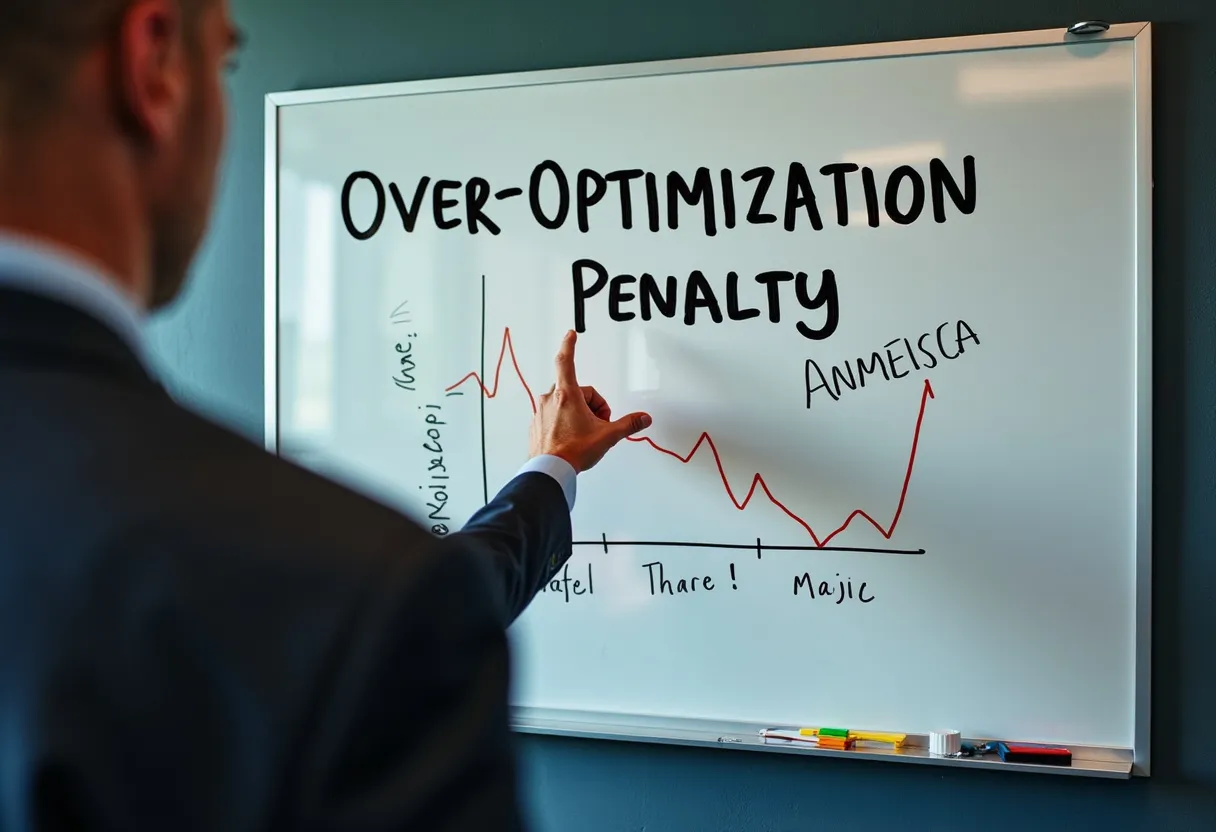Definition
What is Over-Optimization Penalty?
Over-Optimization Penalty refers to a penalty imposed by search engines, particularly Google, when a website employs excessive and unauthorized SEO measures. This penalty can result in a significant drop in rankings or even the exclusion of the website from the search engine index.
How It Works
Function and Concept:
Over-Optimization Penalty is triggered when a website uses SEO techniques excessively, ignoring user interest and focusing solely on manipulating search engine rankings. This includes practices such as keyword stuffing, unnatural link growth, and the use of hidden text or overly optimized anchor texts.
Relevance in SEO:
The penalty is part of Google’s algorithm adjustments, such as the Penguin update, aimed at providing users with relevant and valuable content. These adjustments ensure that websites do not use SEO techniques to artificially inflate their rankings without offering quality content to users.
Practical Use Cases:
Examples of over-optimization include:
- Keyword stuffing: Using the same keywords repeatedly in unnatural ways.
- Excessive link building: Acquiring too many low-quality or irrelevant links.
- Using unnatural anchor texts: Repeatedly using the same keywords in link texts.
- Hidden text: Including text visible only to search engines but not to users.
- Unnatural internal link structures and keyword-stuffed footers, sidebars, and headers.
Why It Matters
Importance in SEO:
Over-Optimization Penalty is crucial because it ensures that websites prioritize user experience and quality content over manipulative SEO tactics. Search engines aim to provide users with the most relevant and valuable content, and over-optimization undermines this goal.
Impact on Website Performance:
The penalty can lead to a significant loss of rankings, reduced traffic, and potentially even exclusion from the search engine index. This can severely impact a website’s visibility and credibility.
Impact on User Experience:
Over-optimized content often results in a poor user experience, as it can be difficult to read and lacks the quality and relevance that users seek. This can lead to higher bounce rates and lower engagement.
Best Practices
Recommended Methods and Strategies:
Focus on Quality Content:
Create content that is valuable, informative, and written for humans rather than search engines. Ensure content is free from spelling, stylistic, and factual errors.
Natural Keyword Usage:
Use keywords naturally and avoid keyword stuffing. Maintain a reasonable keyword density and vary keyword usage to avoid repetition.
Link Building:
Earn relevant backlinks from credible websites. Avoid excessive link building, especially from low-quality or irrelevant sites. Use natural anchor texts and vary link text to avoid repetition.
Technical SEO:
Ensure the website is technically clean but do not overemphasize technical SEO at the expense of user experience. Balance technical optimization with usability and content quality.
Tools and Analysis:
Use tools like Semrush’s On Page SEO Checker to analyze and identify instances of over-optimization. This can help in correcting keyword density, anchor text issues, and other optimization problems.
Adhere to Webmaster Guidelines:
Follow Google’s webmaster guidelines to avoid over-optimization penalties. Ensure that SEO techniques are used in an acceptable amount and do not compromise user experience.
Regular Audits:
Regularly audit your website for signs of over-optimization, such as duplicate content, keyword cannibalization, and meta description issues. Address these issues promptly to maintain SEO health.
Related Terms
For a comprehensive understanding and to further improve your internal linking structure, consider exploring the following related terms:
- Algorithmic Content Creation
- Anchor Text Density
- Exact Match Anchor Text Recovery
- Keyword Density
- Keyword Stuffing
- Meta Keywords
- Penalty Recovery
- SEO Audit
- Spamdexing
- Thin Content
Conclusion
Over-Optimization Penalty serves as a critical mechanism to maintain the integrity and quality of search engine results. By understanding what triggers the penalty and adopting best practices, websites can ensure they provide value to users while achieving sustainable search engine rankings. Prioritizing quality content, natural keyword usage, ethical link building, and compliance with webmaster guidelines will help in avoiding over-optimization issues and sustaining a positive user experience.



